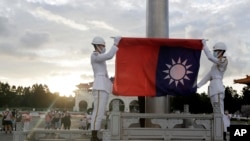China has ramped up efforts to challenge the longstanding status quo across the Taiwan Strait in recent weeks, with Beijing altering a flight path near the median line of the Taiwan Strait and announcing the plan to increase regular patrol in waters near Taiwan’s Kinmen island.
Some analysts say the series of moves are part of Beijing’s attempt to erode Taiwan’s ability to maintain control over waters near islands like Kinmen and Matsu, which are just a few kilometers from the Chinese mainland, and increase pressure on the incoming administration under the ruling Democratic Progressive Party.
“These moves are efforts to erode Taiwan’s ability to administer places like the waters around [the offshore islands] and the west side of the median line of the Taiwan Strait,” Ian Chong, a political scientist at the National University of Singapore, told VOA by phone.
He said the latest development is a departure from Beijing’s past behavior. “From the second Taiwan Strait Crisis on, Beijing never tried to challenge Taipei’s control over Kinmen and Matsu, since leaders on both sides of the Taiwan Strait at the time thought these offshore islands acted as a connection between Taiwan and the Chinese mainland,” Chong said.
After two Chinese fishermen drowned in a chasing episode with the Taiwanese Coast Guard last week, the Chinese Coast Guard announced on Feb. 18 that its Fujian division would increase patrols in the coastal city of Xiamen, which is just a few kilometers away from the Taiwanese island of Kinmen.
The Chinese Communist Party’s Taiwan Affairs Office, which is in charge of cross-strait relations, expressed its support for the Chinese Coast Guard’s announcement, calling the move essential for “upholding order in the relevant waters and ensuring the safety of” Chinese fishermen’s lives and property.
In addition to increasing patrols in waters near Xiamen and Kinmen, the Taiwan Affairs Office also claimed on Saturday that there were no restricted areas for fishing near Kinmen Island, refuting the Taiwanese government’s insistence that it reserves the right to take defensive actions against any Chinese vessel entering “prohibited” waters controlled by Taipei.
Some experts say China’s plan to increase the frequency of coast guard patrol in waters near Taiwan’s offshore islands could further strain cross-strait relations and disrupt Taiwanese fishing vessels’ activities in the region.
“In the past, authorities in Taipei and Beijing could use an existing coordinating mechanism to safeguard the environment in the Taiwan Strait, but the Chinese government’s attempt to hype up the deaths of the two Chinese fishermen may further strain cross-strait relations,” Su Tzu-yun, a military analyst at the Taipei-based Institute for National Defense and Security Research, told VOA by phone.
He said Beijing’s attempt to step up patrols in waters near Kinmen could increase disruption to Taiwanese fishing vessels’ operation in the region. “If the Chinese Coast Guard increases their activities near Taiwan’s offshore islands, Taiwanese fishing vessels could encounter arbitrary search requested by the Chinese Coast Guard or they may be forced to change route,” Su added.
China’s decision to change a flight path west of the median line of the Taiwan Strait, which acts as an unofficial demarcation between Taipei and Beijing, also has triggered angry responses from the Taiwanese government, which characterized the move as an attempt to change status quo across the Taiwan Strait.
Su in Taiwan said China’s sudden change of the flight route is part of its campaign to turn the Taiwan Strait into a domestic waterway as well as part of the ongoing attempt to weaken Taiwan’s sovereignty. “It’s clear that the Chinese government’s move to activate the flight route closer to the median line of the Taiwan Strait is an attempt to erode Taiwan’s sovereignty in the strait,” he told VOA.
In his view, the latest wave of gray zone operations initiated by Beijing will heighten tension in the region and increase other countries’ concerns about China’s aggressive posture. Gray-zone operations involve using irregular tactics without resorting to open combat.
“Since China’s attempt to unilaterally challenge the regional status quo is usually unpredictable, it will likely increase tension in the region,” he said, adding that Beijing’s attempt may force regional countries to join forces and push back against the Chinese government.
With around three months until Taiwan’s new administration comes into power, Chong in Singapore said he expects Beijing to initiate more gray zone activities around Taiwan to keep up the pressure on the incoming government.
“Beijing's approach has been to put more pressure on [Taiwan’s president-elect] Lai Ching-te and his incoming administration to see whether they'll slip up or make a new mistake,” he told VOA, adding that the latest development is part of the Chinese government’s planned process. “We're probably looking into the next year where Beijing will continually try to test Taipei."
As pressure from Beijing is likely to persist, some analysts say Taiwan needs to ensure its military and naval vessels maintain a certain level of deployment readiness while trying to prevent tension from escalating to an uncontrollable level.
“Taiwan needs to be prepared for the worst-case scenario and ensure some of its vessels can be deployed when necessary,” Lin Ying-yu, a military expert at Tamkang University in Taiwan told VOA by phone.
“Taiwan also needs to be prepared for the possibility of resuming some dialogue or interaction with China over issues such as maritime law enforcement,” he added.
















